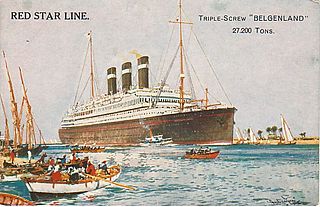Belgenland was the name of two Red Star Line passenger ships:
- Belgenland (1878), operated by Red Star from 1879 until 1904
- Belgenland (1914), operated by Red Star from 1923 until 1934
Belgenland was the name of two Red Star Line passenger ships:
Morning Star, morning star, or Morningstar may refer to:

Star Trek: The Next Generation – A Final Unity is an adventure game by Spectrum HoloByte, based on the Star Trek universe. It was released in 1995 for the DOS and later ported to Macintosh. It puts the player in control of Captain Picard and his crew of the Enterprise D and features traditional point-and-click adventure gameplay as well as free-form space exploration, diplomatic encounters and tactical ship-to-ship combat.
Kitty or Kittie may refer to:

A troopship is a ship used to carry soldiers, either in peacetime or wartime. Operationally, standard troopships–often drafted from commercial shipping fleets–cannot land troops directly on shore, typically loading and unloading at a seaport or onto smaller vessels, either tenders or barges.

The Blue Star Line was a British passenger and cargo shipping company formed in 1911, being in operation until 1998.

Violet Constance Jessop, often referred to as the "Queen of sinking ships" or "Miss Unsinkable," was an Argentine woman of Irish heritage who worked as an ocean liner stewardess, memoirist, and nurse in the early 20th century. Jessop is most well known for having survived the sinking of both the RMS Titanic in 1912 and her sister ship the HMHS Britannic in 1916, as well as having been onboard the eldest of the three sister ships, the RMS Olympic, when it collided with the British warship HMS Hawke in 1911.

Jack "Legs" Diamond, also known as Gentleman Jack, was an Irish American gangster in Philadelphia and New York City during the Prohibition era. A bootlegger and close associate of gambler Arnold Rothstein, Diamond survived a number of attempts on his life between 1916 and 1931, causing him to be known as the "clay pigeon of the underworld". In 1930, Diamond's nemesis Dutch Schultz remarked to his own gang, "Ain't there nobody that can shoot this guy so he don't bounce back?"
Two ships of the United States Navy have been named Algol, after a fixed star in the constellation Perseus.

The International Mercantile Marine Company, originally the International Navigation Company, was a trust formed in the early twentieth century as an attempt by J.P. Morgan to monopolize the shipping trade.

The Red Star Line was a shipping line founded in 1871 as a joint venture between the International Navigation Company of Philadelphia, which also ran the American Line, and the Société Anonyme de Navigation Belgo-Américaine of Antwerp, Belgium. The company's main ports of call were Antwerp in Belgium, Liverpool and Southampton in the United Kingdom and New York City and Philadelphia in the United States.
Four ships of the White Star Line have been named SS Belgic:
SS American Star may refer to the following ships:

SS Belgenland was a passenger ship built in 1914 by Harland and Wolff. She originally served as a freighter and World War I troopship for the White Star Line under the name SS Belgic. Because she was needed for the war effort, she was hastily finished with only two smokestacks and a superstructure only one deck high. Initially used for carrying cargo, in 1918 she was given accommodations for up to 3,000 troops. Her gross register tonnage was listed at 24,547. The doomed liner Justicia was a near identical sister ship, both having been built at the same yard.
Belgenland was a passenger ship built by the Barrow Shipbuilding Company for the Red Star Line, Antwerp.

In 1818 the Red Star Line was founded by Byrnes, Trimble & Co. from New York.. On September 11, 1835 the line was bought by Robert Kermit from New York, a ship-owner and agent for packet ships, and was renamed Robert Kermits Red Star Line. In 1851 Robert Kermit took his brother-in-law Charles Carow into partnership as Kermit & Carow to carry on the business of general ship owning, commission and commercial trading. Robert Kermit died in 1855 and Carow assumed the business. In 1867 the Red Star Line went down.
PS Ruby is the name of several ships:

Adriatic may refer to one of several ships named after the Adriatic Sea:

The Arrol Gantry was a large steel structure built by Sir William Arrol & Co. at the Harland and Wolff shipyard in Belfast, Ireland. It was built to act as overhead cranes for the building of the three Olympic-class liners.
A number of motor ships have been named Star, including: